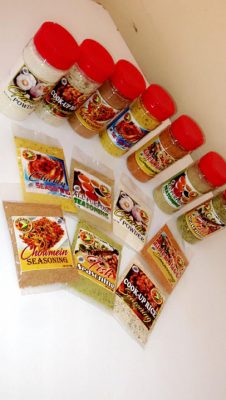Radiek-Ah DeFreitas belongs to a growing clique of budding young Guyanese entrepreneurs who are lifting the well-worn trade of agro-processing out of the antiquated setting in which it had been for decades and into a business setting that can make it a game-changer for up-and-coming investors.
Time was (and that was not too many moons ago) when agro-processing manifested itself in ‘drippy’ tamarind syrup ‘packaged’ in less than sturdy brown wrapping paper and spices comprising leaves and bark of one sort or another offered by grocery shops in neatly fashioned paper funnels. Those days are fast receding in the distance as agro processors like Radiek-Ah bring ever higher standards to the sector, under pressure from an ever more demanding market.
At 28, she bridges the gap between what went before and the contemporary. Sitting at the feet of her mother Sharon, blending the various seasonings and sauces that were sold in the municipal market, she was not yet a teenager when she began to see agro-processing as a likely part of her future. As she grew older, she was already blending her own seasonings and marketing them mostly in Linden, her ambitions as far as product quality was concerned in those days, limited to the standards that the market would accept. That is not to say that she did not continually dream of taking her enterprise to another level.

When we met her at last September’s GUYTIE event at the Marriott Hotel last September, what she boasted of was a manifestation of the strides she had made in less than ten years. Not only had she come to grips with the ‘science’ of blending the herbs and spices to wrest from them the flavours that she desired but she had also become sufficiently conscious of the exacting nature of the market to embrace both the cost and the challenge of upgrading her packaging and labelling to a standard that would find favour with buyers.
At GUYTIE, Radiek-Ah had become transformed. Her booth boasted seven different spices displayed on shelves in eye-catching packaging. The signage showcased Diek-Ah’s spices and they blended well with the very high standards paraded in the hallowed environment of the Marriott Hotel. It was not difficult to tell that in that demanding environment she felt as proud as a peacock.
Later, she was to answer questions raised by this newspaper and to field questions of her own. Yes, hers was a registered business that had met the requirements of the Government Analyst Food and Drugs Department and managed to break through barriers of acceptance by finding their way onto some supermarket shelves; and yes, she was preoccupied with the challenge of at least breaking into the regional market. Arguably her biggest accomplishment to date, she says, is that she now understands just what it will take to get there.
A fair measure of market acceptance has afforded her the breathing space to focus more attention on the ‘business’ of agro processing. Her raw material supplies are assured largely through a contract with an East Coast farmer but there are still mountains to climb. Her domestic kitchen is still her factory and production remains far more demanding than if she possessed the equipment that would render production less labour intensive. The spices must be cooked on a domestic stove and dried and in the process of blending there is tasting. This, is where, she believes, agro processors could use some help from government by perhaps financing manufacturing equipment that can perhaps be shared.
Eventually, she gets to the issue of packaging and labelling. It is the agro processor’s biggest challenge. Product quality can count for little if you don’t get the presentation right. That is the market’s basic rule of thumb…and the bottling and the packaging can cost an arm and a leg. What hurts, she says, is the volumes in which the manufacturers require you to order. Here too, she believes that the sector could use some measure of logistical help. She believes that product prices could be reduced – in some instances by as much as 20 per cent – if packaging and labelling costs could be reduced. There is as well, she says, the need for a packaging factory.
Radiek-Ah’s main priority remains local market acceptance. She believes that this is a critical stepping stone to accessing external markets. Local supermarkets and other outlets she says, should provide more aggressive support for Guyanese agro-produce though she believes that in the final analysis, market acceptance can only truly be earned through high standards. She is, she says, prepared to live by that rule of thumb.





